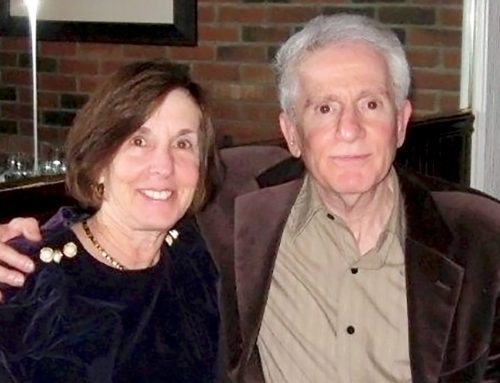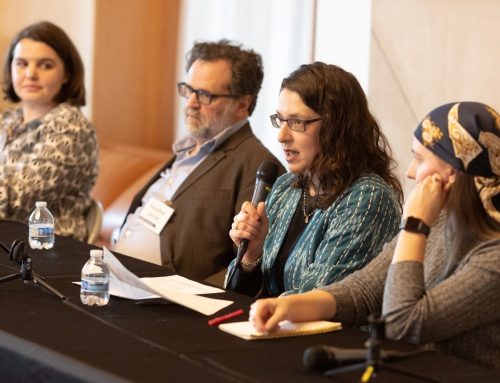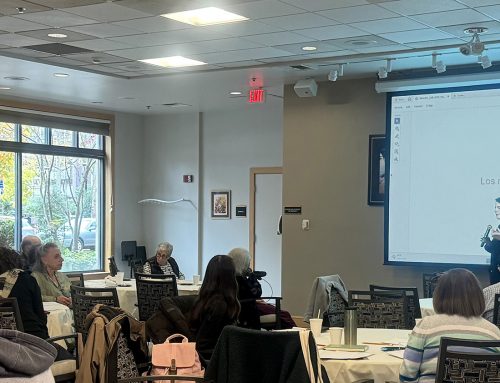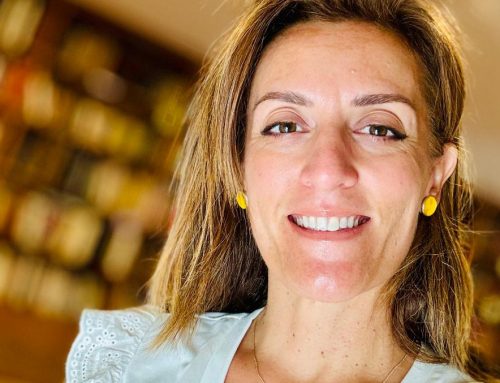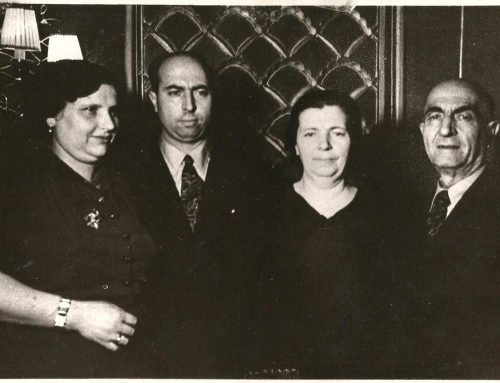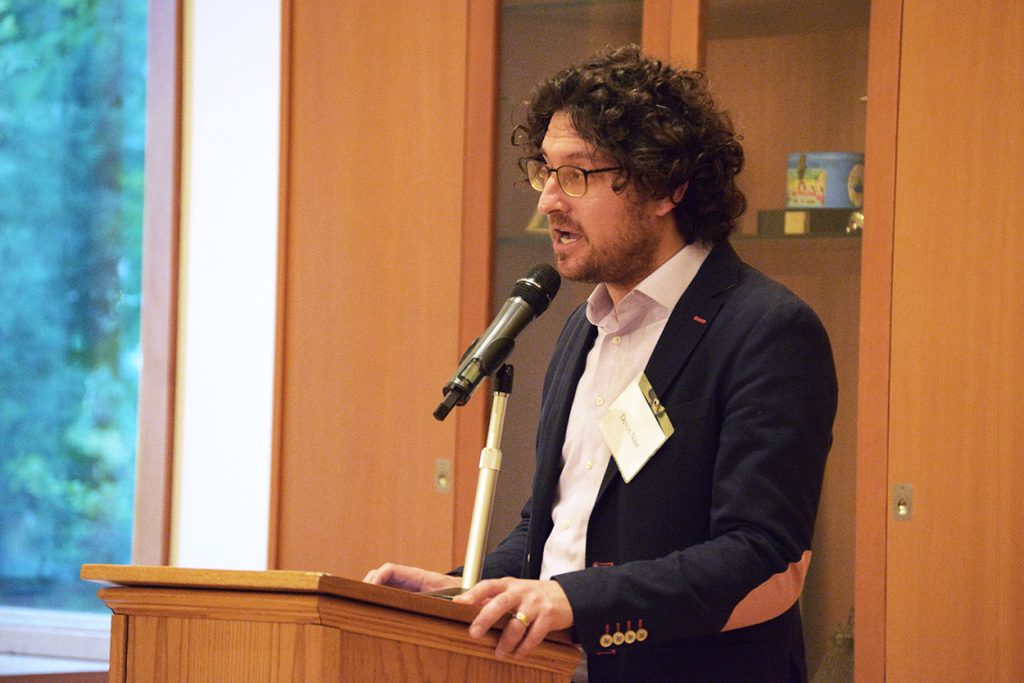
Devin E. S. Naar speaking at the 2024 Stroum Lectures community dinner.
This past academic year has been tremendously challenging and painful. For us, it began on October 7 with the murder of our alumnus and my personal friend, Hayim Katsman, at his kibbutz near Gaza. Despite the relentless sense of grief — a sense that has only intensified over the past months as the number of lives lost increases — one observation I am taking with me into the summer and into next year: We need Sephardic Studies now more than ever before. Despite the incredible pain so many of us feel, we can draw on the past —and the specific entry point that the field of Sephardic Studies offers — to recognize that the present is radically different than the past, despite many throughlines, and thus we can imagine different futures.
Our Sephardic Studies initiatives this last year continue to highlight the multidimensionality of Sephardic experiences that help us move beyond the dichotomies that shape our contemporary discourse: West and East, Jewish and Arab, Jewish and Muslim, and more.
For Ladino Day 2023, which drew six hundred virtual participants from nearly twenty countries, I had the pleasure of interviewing acclaimed novelist Elizabeth Graver about her award-winning novel “Kantika.” With its alluring Ladino-language title referring to song, “Kantika” draws inspiration from Graver’s own family’s experience and challenges the boundaries between history and fiction, truth and the imagination. Graver reimagines the family tale by centering female characters as they traverse the globe during the early twentieth century, from Istanbul to Barcelona, Havana, and New York.
My conversation with Graver also provided the opportunity to launch a new initiative in partnership with the Sephardic Brotherhood of America in New York: the first ever international Sephardic essay competition. Congratulations to our winners, whose work gives important voice to the global Sephardic community and experience.
Collaborating with Israel Studies, in March we hosted Hebrew University professor and musicologist Edwin Seroussi, who gave two marvelous lectures as part of the final installment of a series of annual programs in honor of Hazzan Isaac Azose. One of Seroussi’s lectures focused on the songs of Rabbi Israel Najara, who was the chief rabbi of Gaza in the sixteenth century — and yes, there once was an important Ladino-speaking Jewish community in Ottoman Gaza. Seroussi showed us how Najara was deeply embedded in his Ottoman milieu and drew inspiration from Spanish, Turkish, Arabic, Greek and Ladino musical traditions. Seroussi’s other lecture, “The Sonic Ruins of Modernity,” focused on the trajectory of a single Ladino song and the many forms it has taken and the many places it has been performed, speaks further to the ability of music to transcend national and cultural boundaries. Ke Guo, a recent Ph.D. from UW’s School of Music and a Stroum Center Finish Line Fellow, performed several Ladino songs along with Reynaldo Ruiz as part of the program.
During this academic year we also hosted sociologist Aziza Khazzoom, an Israeli American with Baghdadi Jewish roots, who spoke on the interconnections between antisemitism and Islamophobia. We also welcomed back Shalom Sabar, a renowned scholar of Jewish art and material culture at Hebrew University. He gave a seminar on the invention of the postcard and the role it played in transmitting visual representations of Jewish life in Salonica and the broader Ottoman Jewish world.
One of our longest ongoing projects continues to move forward apace. The Sephardic Studies Collection now constitutes one of the largest repositories of Ladino books and archival documents in the United States. UW Assistant Professor of Eastern Mediterranean Jewish Languages, Literatures, and Cultures Canan Bolel worked tirelessly with several students to improve our metadata cataloging, including graduating senior Anna Feit. Feit, who will be heading to Brazil on a Fulbright scholarship next year, not only enrolled in professor Bolel’s Ladino course but also drew on her background in library sciences to prepare physical items in our collection for transfer to the UW Libraries Special Collections. In Feit’s graduating interview with the Henry M. Jackson School of International Studies, she shares why working with the Sephardic Studies Program was “the most impactful experience” she had as an undergraduate student at the UW!
As is very apparent, the Sephardic Studies Program has grown by leaps and bounds in recent years to encompass multiple faculty, staff, and students. Among this past year’s Stroum Center graduate fellows, several focused on research related to Sephardic Studies. Joana Bürger (History) has been researching Jewish refugees of the 1930s and 1940s, and recently recounted the incredible story of a Sephardi-Catholic-German-Turkish family’s survival during the Holocaust. Sasha Marie Ward (Near and Middle East Ph.D. Program) is delving into the difficulties faced by descendants of “Dönme” Jewish converts to Islam in Turkey. Büsra Demirkol (Near and Middle East PhD Program) continues to develop her fascinating work on the role of Jewish practitioners in midwifery and gynecology in 19th- and 20th-century Ottoman society. And Elyakim Suissa (Middle Eastern Languages and Cultures) completed his M.A. thesis looking at the historical insights found in Ottoman Jewish and Muslim legal writing. We wish Elyakim much success as he embarks on his Ph.D. at the University of Pennsylvania to study, in part, under the mentorship of a former UW alum and Sephardic Studies affiliate, Oscar Aguirre-Mandujano!
Moreover, we are also delighted to report that the Sephardic Studies Program has secured additional support to sustain our initiatives into the future. The newly established Sephardic Studies Sustainers’ Circle brings together a group of local Sephardic families who have committed themselves to supporting the Sephardic Studies Program and all our endeavors. In addition to the Isaac Alhadeff Foundation, which has sustained us over many years, we express our gratitude to Joel and Maureen Benoliel, Harvey Sadis and Harriett Cody, and the newest member of the circle, Harry Caraco. Mersi muncho!
None of our accomplishments could have been achieved without our amazing staff, especially the Sephardic Studies assistant director Jennifer McCullum, as well as the entire Stroum Center team, including web and digital projects manager Kara Schoomaker, events and outreach manager Grace Elizabeth Dy, our new associate director Aliyah Vinikoor, and finally, the Stroum Center director Mika Ahuvia, as well as all of the staff in the Henry M. Jackson School of International Studies and in Advancement who support our work.
In closing, I am excited to share I will be on sabbatical this coming academic year! While I will continue oversight of the Sephardic Studies Program, I will be taking a step back over the next year to focus on completing my next book on the history of Sephardic Jews in the United States.
As we reflect on both the tremendous and ongoing heartbreak and challenges of this past year and take stock of all our accomplishments, perhaps we can take inspiration from a classic Ladino refran, or proverb: Kuando se eskurese, es para amaneser. When it is dark out, do not forget that dawn is coming.
Devin E. S. Naar
Chair, Sephardic Studies Program
Isaac Alhadeff Professor in Sephardic Studies
Associate Professor, Stroum Center for Jewish Studies & Department of History

